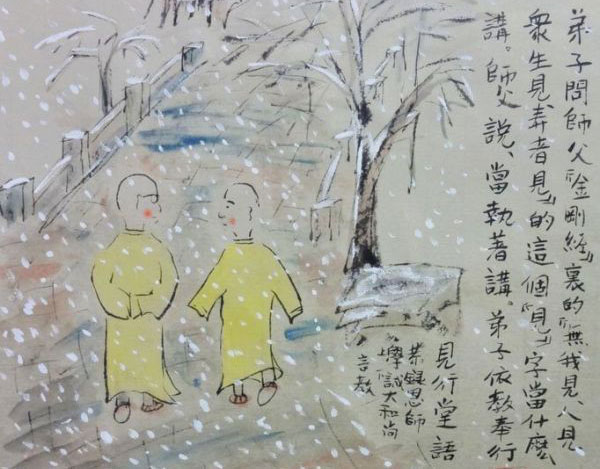In this Chapter, Buddha described the essential nature of Bodhisattva (enlightened beings that serves in this world): transcendence of the notion of: self, others, beings, and immortals.
self: a separate sense of individual self
others: what appears outside of one’s self
beings: the collective living beings
immortals: any part of life, form or no-form, that continue to exist indefinitely
Why does Bodhisattva not attached to the above 4? For a Bodhisattva is a state of enlightenment which is beyond separation or duality. And alignment with self, others, beings, or immortality implies separation in various levels.
Therefore, the Buddha described that a Bodhisattva that clings to the notion of these 4 is not a real Bodhisattva: I.e. there is no “one” that can be Bodhisattva, no Bodhisattva who could perceive “others” or “collective beings”, and no Bodhisattva who could “last” forever. Clinging or attachment to these 4 notions, therefore, represents sidetracks to, or misunderstanding of, the pathway of Bodhisattva towards spiritual enlightenment.
This transcendence of separation and opposition, as a key direction in spiritual cultivation, is basically in line with the Daoist notion of non-duality, represented in the Tai-chi diagram, which embraces and transcends separations and opposites (Yin and Yang) in perfect harmony.
* * *
大乘正宗分第三
THE ORTHODOX DOCTRINE OF THE GREAT VEHICLE, THREE
佛告须菩提:诸菩萨摩诃萨应如是降伏其心!所有一切众生之类:若卵生、若胎生、若湿生、 若化生;若有色、若无色;若有想、若无想、若非有想非无想,我皆令入无余涅槃而灭度之。如是灭度无量无数无边众生,实无众生得灭度者。
何以故? 须菩提!若菩萨有我相、人相、众生相、寿者相,即非菩萨。
The Buddha said: “Subhuti, “all Bodhisattvas and Mahasattvas should subdue their minds as follows: “All living beings born from eggs, wombs, humidity or by transformation, with or without form, either thoughtful or thoughtless,and neither thoughtful nor thoughtless, are all led by me to the final nirvana for the extinction of reincarnation. Although immeasurable, uncountable and unlimitable numbers of living beings are thus led to (the final nirvana for) the extinction of reincarnation, it is true that not a living being is led there.
Why so, Subhuti? (Because) if a Bodhisattva (still) clings to the false notion (laksana) of an ego, a personality, a being and a life, he is not ( a true) Bodhisattva.在这一章中,佛描述了菩萨(觉悟有情)都超越了的素质:我,人,众生,和寿者。
我:一个单独的个人自我意识
人:自我之外的他人
众生:集体众生
寿者:有形或无形的有寿命生命体
菩萨为什么超越上述4种知觉?因为菩萨是一个非分离或超二元的境界。而我,人,众生,寿者则意味着不同形式或程度的分离。
因此,佛陀说执着于这4种概念的菩萨不是真正的菩萨:因为没有任何“人”能成为菩萨;没有菩萨能觉知与自身不一的“他人”或“众生”;也没有菩萨能永久的“生存”。所以,执着于这4个概念,并不是真正的菩萨。
这种对对立和分的超越,作为修炼的主要方向,基本上与道家的超二元观念是一致的。(太极图中涵盖并超越了阴阳的对立和分离)
* * *
大乘正宗分第三
佛告须菩提:诸菩萨摩诃萨应如是降伏其心!所有一切众生之类:若卵生、若胎生、若湿生、 若化生;若有色、若无色;若有想、若无想、若非有想非无想,我皆令入无余涅槃而灭度之。如是灭度无量无数无边众生,实无众生得灭度者。
何以故? 须菩提!若菩萨有我相、人相、众生相、寿者相,即非菩萨。


Leave a Reply